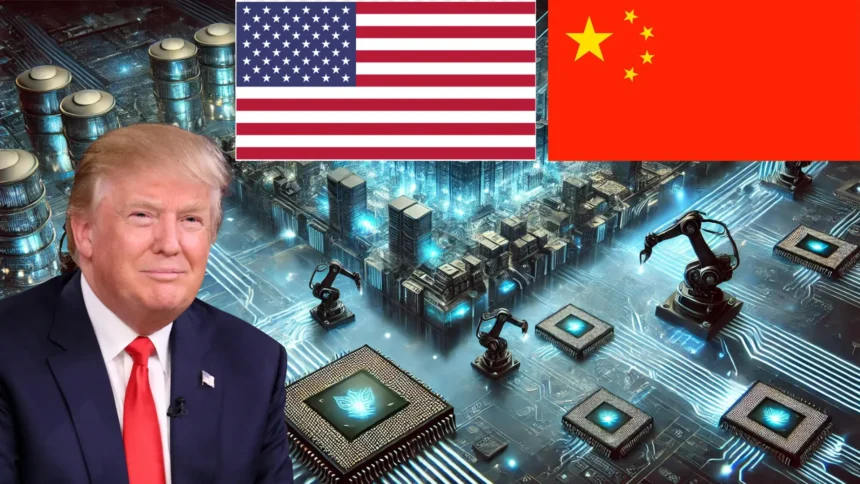Microsoft Urges Trump to Revise AI Chip Rules
Microsoft is urging U.S. President Donald Trump to revise strict AI chip export rules, warning that these restrictions could unintentionally benefit China’s artificial intelligence sector. Initially introduced under the Biden administration, these rules aim to curb China’s access to advanced semiconductors. However, they also restrict U.S. allies like India, the UAE, Israel, and Switzerland, making it harder for them to develop AI capabilities.
In a blog post, Microsoft stated that these restrictions could push U.S. allies toward China as an alternative AI technology partner, ultimately weakening America’s position in the global AI race.
Why AI Chip Export Rules Matter
AI chips are essential for training and running complex AI models. Countries that lack access to these high-performance semiconductors struggle to develop cutting-edge AI systems. The U.S. government imposed these export controls to limit China’s progress in artificial intelligence, but the impact on friendly nations has raised concerns among tech giants like Microsoft.
Microsoft’s Warning: A Gift to China?
Microsoft President Brad Smith, in an interview with The Wall Street Journal, warned that the restrictions could give China a major advantage in AI development, similar to its rapid dominance in 5G telecommunications.
Left unchanged, the Biden rule will give China a strategic advantage in spreading over time its own AI technology, Microsoft stated.
China is already leveraging this opportunity, presenting itself as a reliable AI technology provider for countries struggling with U.S. chip shortages.
How AI Chip Rules Are Impacting Global AI Development
The restrictions are not just hurting China but also affecting U.S. companies and the global AI landscape. Here’s how:
- Nvidia Faces Market Limitations – Nvidia, a global leader in AI chips, has struggled with the restrictions, limiting its ability to supply high-end AI semiconductors worldwide.
- U.S. Allies Face AI Roadblocks – Countries like India, Israel, and the UAE rely on U.S. chips for AI research and innovation but now face difficulties in acquiring them.
- China’s AI Sector Gains Momentum – Chinese startups like DeepSeek are emerging with cost-effective AI chip solutions, filling the void left by U.S. export controls.
Trump Administration’s Possible Response
The Trump administration is currently reviewing the AI chip export restrictions that were introduced under the Biden administration. While these rules were meant to prevent China from advancing its artificial intelligence capabilities, they have also limited access for key U.S. allies, including India, Israel, Switzerland, and the UAE.
This has raised concerns among tech giants like Microsoft, which argue that these restrictions may weaken U.S. partnerships while unintentionally benefiting China.
To address these concerns, reports suggest
- Stricter Controls on China – The administration is considering tightening restrictions on China to limit its access to advanced AI chips and prevent technological advancements that could challenge U.S. dominance.
- Easing Access for U.S. Allies – At the same time, the U.S. may loosen restrictions for friendly nations like India, Israel, Switzerland, and the UAE, allowing them to continue developing their AI industries.
- Preventing Dependence on China – By ensuring that allied nations receive necessary AI chips, the U.S. can prevent them from seeking alternative partnerships, especially with China, which is actively expanding its AI sector.
- Maintaining Strategic Alliances – Adjusting these export policies would help the U.S. strengthen relationships with key allies while still restricting China’s access to cutting-edge semiconductor technology.
Another key factor in this decision is the impact on U.S. companies like Nvidia, which rely on global markets for AI chip sales. Current restrictions have limited their ability to expand internationally, affecting business growth and innovation. If the U.S. allows allies to access AI chips under controlled conditions, it could help American tech firms regain lost markets while still keeping China’s AI ambitions in check.
Ultimately, the Trump administration faces a critical choice—maintain the current restrictions, risking strained relationships with allies, or introduce a more balanced policy that strengthens partnerships while protecting national security.
As the global AI race accelerates, the U.S. must carefully navigate its strategy to ensure it remains the world leader in artificial intelligence without inadvertently pushing its allies toward China.
For more insights on other trending news, click here!
Final Thoughts: Will the U.S. Adjust Its AI Export Strategy?
The AI chip export restrictions were designed to protect U.S. technology leadership, but they are now creating challenges for friendly nations and American tech companies. Microsoft’s warning highlights a critical decision for the Trump administration:
Keeping strict restrictions could limit China’s AI progress but risk losing strategic allies.
Easing rules for allies could strengthen partnerships and prevent China from expanding its AI influence.
With the global AI race intensifying, all eyes are on Washington to see whether the U.S. will adapt its policies—or if China will seize the opportunity to dominate the AI sector.
Disclaimer: The information provided in this article is for general informational purposes only. All views and statements are based on publicly available sources and do not reflect the official stance of TN HEADLINES24. While we strive for accuracy, we do not guarantee the completeness or reliability of the content.
TN HEADLINES24 is not responsible for any decisions made based on the information in this article. Readers are encouraged to verify details from official sources before drawing conclusions or taking action.

